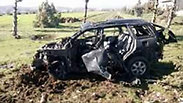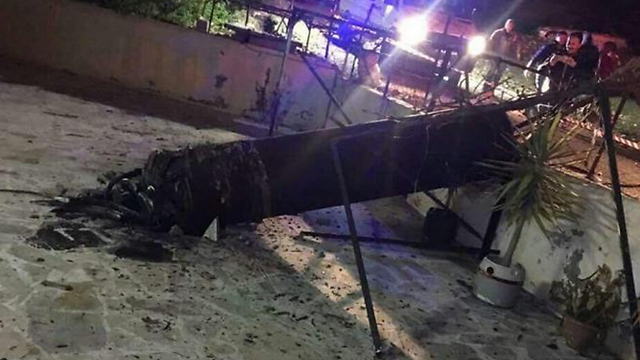
Vehicle attacked in alleged Israeli drone strike, which killed member of a pro-regime militia
In light of changes in Syria, Israeli policy must be updated
Analysis: The situation in the northern arena requires Israel to clarify its strategic targets, while continuously and thoroughly reviewing the benefit of its moves versus the risk of unwanted escalation. The most important diplomatic and military objective is to prevent Iran from putting down roots in Syria.
Two incidents from the past week call for a re-discussion of Israel’s policy vis-à-vis the situation in the northern arena. First, the strike in Syria, which was followed by the interception of a long-range SA5 missile fired by the Syrian army. Later, there were reports of another Israeli strike, which killed a senior member of the militia supported by the Syrian regime and by Hezbollah.
These incidents stand out against the consistent Israeli choice since 2011 not to intervene in the Syrian civil war. Until now, Israel has stuck to a policy of defining red lines and acting if these red lines were crossed. On the tactical level, the basket of responses was comprised of attacking sources of fire, attacking the Syrian army which failed to prevent the fire, and targeting terror organizations that are directed and funded by Hezbollah and Iran in the Syrian Golan Heights. On the strategic level, according to foreign sources, the IDF led a battle against Hezbollah’s attempts to arm itself with high-quality military power components: Advanced Russian-made surface-to-air missile batteries, accurate Iranian-made ballistic missiles, advanced surface-to-sea missiles, and more.
The IDF carried out this battle while attempting to balance between the advantages concealed in harming Hezbollah’s intensification and the risks of escalation involved in this activity. Israel made sure to maintain a level of vagueness, as it believed that would lower the risk of a response by Hezbollah or the Assad regime. What helped the Israeli activity get lost in the overall noise of the civil war in Syria were the ongoing strikes of the Russian, American and Turkish air forces. The fact that Israel admitted that it had struck in Syria last week does not reflect a new policy, but was because Israel could not hide the fact that it had used the Arrow anti-missile system to intercept the Syrian projectile.
Nevertheless, the trends taking shape in Syria right now require an update of the Israeli policy. The most significant variable is the Russian military presence and dominance in Syria, alongside Iran’s support, which helped the Syrian regime recover and rebuild its self-confidence.
In this context, Israel should clarify its strategic targets again and continuously and thoroughly review the benefit of its moves versus the risk of unwanted escalation. The basic component is establishing and reinforcing the deterrence, and Israel must also make it clear both to Lebanon and to Syria that putting their territory and infrastructure at the disposal of Iran and Hezbollah’s terror infrastructure means serious future damage to the army, regime and national infrastructure of these countries.
As for preventing Hezbollah from growing stronger, an updated assessment is needed on whether the strikes disrupt the organization’s power-building process in a way that justifies the risks of escalation: If the damage to Hezbollah’s intensification is minimal, it is possible that the risks of escalation are unjustified; and if it is significant, Israel must keep preventing Hezbollah from arming itself with high-quality weapons.
As for preventing the establishment of terror infrastructures in the Golan Heights, it is definitely necessary to act against infrastrctures operated by Iran, Hezbollah or the Syrian regime in the Golan Heights based on high-quality intelligence. The calm in the Golan must be maintained, just the like calm on Israel’s border with Lebanon has been maintained since 2006, and Israel must make it impossible to open a terror front from the Syrian Golan Heights.
On the deeper strategic level, Israel’s important diplomatic and military objective is to prevent Iran from putting down roots in Syria. Creating Iranian sea or air bases in Syria would be a negative strategic change, and Israel must do everything to prevent that. The most efficient tool for that is, on the one hand, an Israeli dialogue with the Kremlin, while clarifying that Iranian presence could jeopardize stability in Syria, and on the other hand, a dialogue with the Trump administration, which may reach a global deal with Russia. The Israeli interest of keeping Iran away from Syria must be secured in any such deal.
Major-General (res.) Amos Yadlin is the director of Tel Aviv University's Institute for National Security Studies (INSS).











